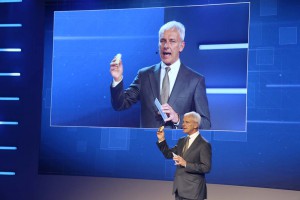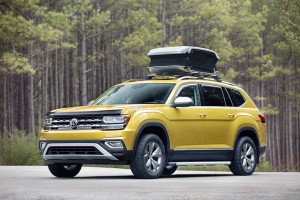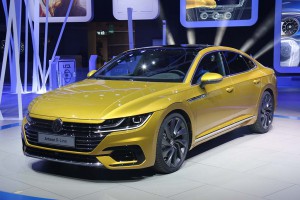Volkswagen revealed a classic good news/bad news scenario on Tuesday morning. After reporting record group profits last month for 2016, the automaker now says operating earnings at the flagship VW brand took a sharp hit as a result of the maker’s diesel emissions scandal.
The automaker has so far agreed to spend nearly $25 billion on fines and settlements in the U.S. alone as a result of the scandal, and that doesn’t include a hefty increase in marketing costs since the diesel engine rigging was revealed in September 2015.
Nonetheless, Volkswagen Group CEO Matthias Mueller put a positive outlook on the maker’s current situation, insisting it was “back on track” after one of the worst crises in its eight-decade history. Mueller himself took home 7.8 million euros, or $8.5 million, in pay and other forms of compensation for 2016.
Operating profits for the Volkswagen brand fell 10%, to 1.9 billion euros, or $2 billion, in 2016, while the brand’s profit margin slide from 2% in 2015, to just 1.8%. That was significantly lower than such rivals as Toyota, Ford and Nissan, and reflects a number of different factors, according to industry analysts, including the diesel emissions scandal.
(VW officially pleads guilty to felony charges in U.S. District Court. Click Here for the full story.)
In September 2015, the U.S. Environmental Protection Agency accused VW of rigging its 2.0-liter diesel engine to illegally pass American emissions tests. The automaker subsequently acknowledged using a so-called “defeat device” on that engine, as well as a more upscale, 3.0-liter diesel.
In a series of civil and criminal settlements, VW has since agreed to buy back about 500,000 vehicles using those engines, though it also plans to repair some of the vehicles using the larger engine. While the vast majority of the rigged products were sold under the VW brand, some were also marketed by Volkswagen’s Audi and Porsche divisions.
A settlement reached with government regulators last July is expected to cost $14.7 billion. Subsequent agreements with the government, as well as VW dealers and owners, has added about $10 billion to the total.
The maker has also struggled to rebuild demand at its U.S. showrooms, sales plunging by double-digit levels during the early months of 2016. In recent months, however, VW has been posting big sales gains which, analysts note, have come at a hefty price: a significant increase in the maker’s incentives costs.
(Shifting focus to SUVs, VW to now offer two Tiguan models in the U.S. Click Here for more.)
During his Tuesday news conference, CEO Mueller stressed that VW sees the U.S. as a “core market,” and will take significant steps to rebuild its position there. It recently completed the expansion of its Chattanooga, Tennessee assembly plant to add production of the all-new Atlas SUV and, during last week’s Geneva Motor Show media preview, senior officials indicated they are working on other products specifically geared for the American market.
Among the various models introduced in Geneva, VW unveiled the Arteon, which will be billed as the brand’s new flagship, atop the current Passat model. The U.S. is seen as a key market for Arteon.
“We are standing by our investment decisions and intend over the long term to play a significantly greater role there than today,” Mueller said during the earnings news conference, referring to the relatively weak share VW currently holds in the States.
More broadly, Mueller said 2017 should be a good year for Volkswagen and its 12 car and truck brands. He stood by an earlier forecast for a global 4% increase in sales revenue, and estimated group profit margins will run between 6% and 7%, compared to 6.7% in 2016.
“You can rest assured that we will do everything in our power to make 2017 an even better year than 2016,” Mueller promised.
(VW updates Atlas for weekend warriors. Click Here for the story.)



